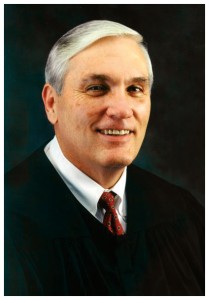 The Kentucky Court of Justice was sorry to learn of the passing of Supreme Court Justice James E. Keller (ret.), who lost his battle with cancer this afternoon, June 2. Justice Keller was 71. There will be a memorial service on Saturday, June 7, 2014, at 2 p.m., at Kerr Brothers Funeral Home at 3421 Harrodsburg Road, Lexington. Visitation will also take place Saturday from 10 a.m. to 2 p.m.
The Kentucky Court of Justice was sorry to learn of the passing of Supreme Court Justice James E. Keller (ret.), who lost his battle with cancer this afternoon, June 2. Justice Keller was 71. There will be a memorial service on Saturday, June 7, 2014, at 2 p.m., at Kerr Brothers Funeral Home at 3421 Harrodsburg Road, Lexington. Visitation will also take place Saturday from 10 a.m. to 2 p.m.
“The strength of his personality and character and the depth of his intellect and integrity made Jim Keller an exemplar for a generation of Kentucky’s trial judges,” Chief Justice John D. Minton Jr. said upon hearing the news. “The Kentucky Court of Justice mourns his loss.”
Justice Keller represented the 5thSupreme Court District during his tenure on the state’s highest court. The district is comprised of Anderson, Bourbon, Boyle, Clark, Fayette, Franklin, Jessamine, Madison, Mercer, Scott and Woodford counties. He practiced law with Gess Mattingly & Atchison P.S.C. in Lexington after his retirement from the Supreme Court in 2005. The following bio was taken from his retirement reception program (attached).
James E. Keller: A Life Spent on the Law
From the time he was admitted to law school after only three years of college, Justice James E. Keller began moving at a fast clip through a legal career that spanned 40 years and ultimately landed him on the bench of the Supreme Court of Kentucky.
During his progression from attorney and master commissioner to circuit judge and Supreme Court justice, his unique influence on the justice system steadily surpassed its Central Kentucky roots and left its mark statewide. While legal acuity alone makes Justice Keller’s legacy distinct, it is for his tenacity to improve the court system for ordinary citizens that he will be honored and remembered.
The Early Years, 1942 – 1976
Justice Keller was born in Harlan, Ky., in 1942, and was one of two sons. He worked on an undergraduate degree while attending Eastern Kentucky University on a football scholarship, but left EKU after three years when he gained early admission to law school at the University of Kentucky. He graduated in 1965 with a juris doctor and spent the next 11 years in private practice. From 1969 to 1976, he also served as master commissioner of Fayette Circuit Court. In 2000, EKU awarded him a bachelor’s degree in business administration.
Fayette Circuit Judge, 1976 – 1999
He was appointed as circuit judge for Fayette County in 1976. During this highly productive phase of his career, he served two terms as chief circuit judge, was co-chair of the first Fayette Family Branch and volunteered as a Drug Court judge. He was twice elected president of the Kentucky Circuit Judges Association.
Justice Keller helped establish several innovative and effective court programs during his tenure as a circuit judge. He is most proud of his efforts as co-founder of the Parents Education Clinic, a clinic to teach divorcing parents about the emotional implications for children of divorce, and Kids’ Time, a clinic to help elementary students understand and cope with divorce. The clinics have served as a model for a program that is now used in many Kentucky jurisdictions.
He also co-founded the Mediation Center of Kentucky, a nonprofit organization that offers the services of trained mediators to people who want to resolve their disputes outside of a courtroom. He was instrumental in implementing Fayette Drug Court, a program designed to return nonviolent criminal drug abusers to productive lives. In addition, his interest and expertise in computer technology led him to create the first Internet home page for Fayette Circuit and District courts.
Supreme Court Justice, 1999 – 2005
He was appointed to the Supreme Court of Kentucky in 1999 and was subsequently elected in 2000 to a full term as representative of the 5th Supreme Court District. “I have attempted to serve by upholding the existing law, but advancing it when necessary, “ said Justice Keller of his service on the court. “We are all guaranteed certain fundamental rights by the law, and we must uphold those rights. That’s what I have tried to do on the Supreme Court.”

